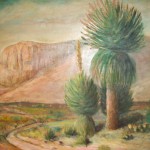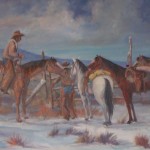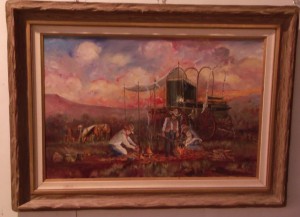
There should be a balanced order of shapes when laying out a landscape composition. I like to carry two “L” shaped pieces of matte board with me at all times. when I see a scene that I think is capable of making a picture I adjust them like a viewfinder, working with them to get the “just right” composition. Then I make a quick sketch of what I am seeing. Later back in the studio I might rearrange, add something in, take something out, and on and on, with dozens of small thumbnail sketches until I capture what I desire. I’m always in quest of the next “masterpiece.”

It wasn’t until the eighteenth century that the changing effects of light and weather on a landscape became such a popular subject matter. The definitions of individual features and the length of shadows can dramatically change a scene, so it is always essential that an artist be aware of the passage of the sun.
When you paint weather, such as, rain, snow, or fog, you want it to be as realistic as possible. You have to realize how light affects these conditions and what it does to the various hues in the painting. They are all influenced by light deflection.

Here are a few tips to consider when painting light:
- At Sunrise: The temperature of the painting becomes warm and not cool. Consider starting with a Cadmium Yellow Light or Lemon Yellow wash
- At Midday:When the sun is directly overhead, a darker yellow should be dominant throughout the painting. Experiment with this but often yellow ochre and oranges will be a good place to start.
- 3. Late Afternoon: As the sun falls into the western hemisphere, more oranges and reds and purples are evident. By sunset, the yellow hues have almost vanished.
